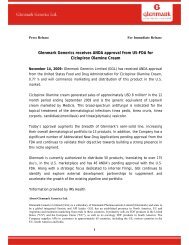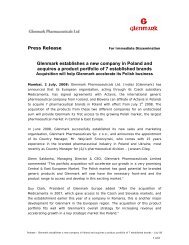Glenmark
Glenmark
Glenmark
Create successful ePaper yourself
Turn your PDF publications into a flip-book with our unique Google optimized e-Paper software.
e a delay in the submission or approval of potential new products for marketing approval. The regulations<br />
applicable to our existing and future products may change. In addition, the submission of an application to<br />
a regulatory authority does not guarantee that a licence to market the product will be granted. Each<br />
authority may impose its own requirements and/or delay or refuse to grant approval, even when a product<br />
has already been approved in another country. In our principal markets, the approval process for a new<br />
product is complex, lengthy and expensive. Whether or not a product is approved in India or other<br />
jurisdictions, regulatory authorities in many of these markets to which we export products must approve<br />
that product before we can begin to market it in those jurisdictions. The time taken to obtain approval<br />
varies by country but generally takes from six months to several years from the date of application. This<br />
registration process increases our cost of developing new products and increases the risk that we will not<br />
succeed in selling them successfully or profitably.<br />
Also, governmental authorities, including the USFDA, heavily regulate the manufacture of our products.<br />
The USFDA approval of a new drug application prior to any commercial sale or shipment of a product<br />
requires not only the approval of the product itself but also pre-approval and post-approval inspections of<br />
product manufacturing and testing facilities. Our formulation and API plants have received approval to<br />
manufacture and test products for the international regulated and semi-regulated markets where we operate.<br />
If we fail to comply fully with such regulations whether presently or in future, then as a result of possible<br />
government-enforced shut-down of production facilities which will limit our supply of raw materials and<br />
result in product shortages, our ability to supply our products to key markets would be significantly<br />
impaired, which could in turn lead to a decrease in overall profitability. A failure to comply fully with such<br />
regulations could also lead to a delay in the approval of new products for the commercial sale or shipment<br />
of those products into the respective markets which could, in turn, result in a loss of revenue, and may<br />
serve as an inducement to bring law suits against us. Penalties for non-compliance with applicable<br />
domestic and foreign governmental law and regulations could be severe, including revocation or<br />
suspension of our business licence in a particular jurisdiction and imposition of penalties and criminal<br />
sanctions which could have an adverse effect on us.<br />
The success of our operations in regulated and semi-regulated markets is dependent on a number of<br />
factors beyond our control.<br />
We operate in a number of markets which in the pharmaceutical industry are considered to be heavily<br />
regulated, including the United States and Europe, for the sale and distribution of generic formulations and<br />
APIs. We have filed several Drug Master Files (“DMFs”) for our APIs and an abbreviated new drug<br />
application (“ANDA”) for our formulations with the USFDA. We expect to file more ANDAs for our<br />
formulations with the USFDA. We have made substantial investments for establishing new manufacturing<br />
facilities and upgrading our existing manufacturing facilities so that they comply with the standards set by<br />
the USFDA and other regulatory authorities. As and when innovator's patents exclusivity period for our<br />
products expire, we expect to sell and distribute such products in the United States. This strategy is<br />
dependent upon our obtaining approval of the USFDA for these and other products. Delays in filing DMFs<br />
and ANDAs, or in further inspection and approval of our facilities and products by the USFDA or other<br />
applicable regulatory authorities, could adversely affect this strategy and the timing thereof, which in turn<br />
could adversely affect our results of operations and prospects.<br />
Our strategy of growth in the regulated markets may not result in additional revenue or operating income as<br />
anticipated. The costs involved in operating in these markets may be higher than expected and we may<br />
face significant competition in these regions. Furthermore, regulated markets such as the United States,<br />
Europe and Japan have experienced significant decreases in recent years in the prices of generic<br />
formulations and APIs, as well as strong competition among local and international players. In light of<br />
such factors, we agreed sales allowances to customers of Rs. 117 crores in the fiscal year 2009. Continuous<br />
price erosion could adversely reduce our sales revenue and profit potential after we have entered the<br />
regulated markets. As a result of these and other changes in our business environment, we cannot assure<br />
you that our business model will continue to be successful.<br />
We also operate in semi-regulated markets across Africa, Asia, Latin America, Central and Eastern Europe<br />
and Russia/CIS. Our growth in these markets is dependent on our ability to create and market a branded<br />
7



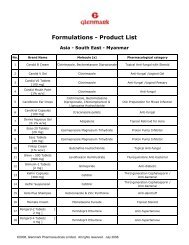
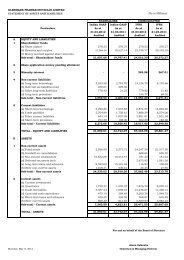
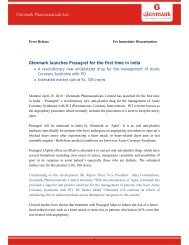
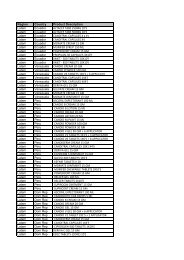
![Formulations [India] â Product List - Glenmark](https://img.yumpu.com/46601329/1/190x245/formulations-india-a-product-list-glenmark.jpg?quality=85)
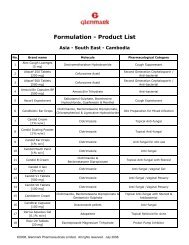
![Formulation [India] â Product List - Glenmark](https://img.yumpu.com/44013338/1/190x245/formulation-india-a-product-list-glenmark.jpg?quality=85)
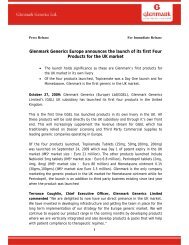

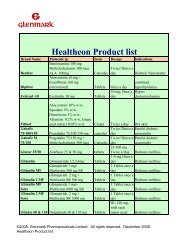
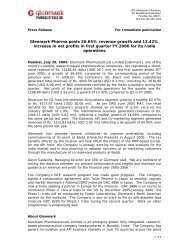
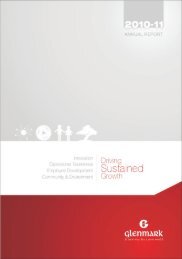
![Formulations [India] â Product List - Glenmark](https://img.yumpu.com/35994839/1/190x245/formulations-india-a-product-list-glenmark.jpg?quality=85)
